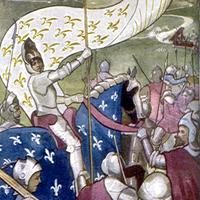26. The Sea of Darkness
"To open up those wastes of tide No generation opened before. We now open a wonderful new chapter in the world's history, a chapter full of mystery, adventure, and discovery, when the spirit of enterprise was awakened and the eyes of all men were turned towards the boundless Sea of Darkness and the unknown lands beyond. It had been a triumphant day for the old Phœnicians when they had at last sailed through the terrible pillars of Hercules — which were supposed to mark the bounds of the world—and found a great rough sea rolling in beyond the Mediterranean. This farthest point of legendary adventure was now to be the starting-point of the new voyagers. Portugal, lying just outside the Pillars of Hercules,—or Gibraltar, as we call the narrow passage now,—was the home of those who were the first to break the charm of the Mediterranean. Until this time the Great Sea had been the centre of all civilisation. Around its shores had been grouped the chief races of mankind—the Phœnicians and Carthaginians, the Greeks and Romans; over her blue waters the traffic of the world had passed.
True, the men of the Middle Ages were beginning to dream of something beyond. Through the dreaded Sea of Darkness had been found narrow belts of light. Ships from Venice braved the dreaded Bay of Biscay to get to the Netherlands for the sake of trading with Bruges and Ghent. It took them eight long months to reach the bleak North Sea from their sunny waters of the Adriatic.
The men of Portugal, the extreme west of Europe, looked out over the rough waters of the Sea of Darkness. Their capital, Lisbon, stood at the mouth of the river Tagus, which flowed into the unknown ocean; and they must often have wondered what lay beyond this great strong sea, the waves of which dashed higher than those of the Mediterranean Sea.
Only five centuries ago this great Atlantic Ocean, across which steamers from all countries are steaming to-day, was described by an old writer as "a vast and boundless ocean, on which ships dare not venture out of sight of land. For even if the sailors knew the direction of the winds, they would not know whither those winds would carry them, and, as there is no inhabited country beyond, they would run great risk of being lost in mist and vapour. The limit of the West is the Atlantic Ocean," adds this old writer with certainty. But now a great light was to be shed over this mysterious sea. One man—born and bred in Portugal—was to awake his sleeping nation to the wonderful possibilities of the unknown sea. His name was Prince Henry of Portugal. His father was King John of Portugal, and his mother was an Englishwoman—Queen Philippa.
This Queen had shared the throne of Portugal with King John for twenty-eight years, and her son Henry was but twenty when she lay dying. He was just starting with his father and two brothers for a great Moorish port on the African side of the Straits of Gibraltar. The three princes had all asked for knighthood, and the king had decided that they should have a chance of winning their spurs in this African Crusade. They were due to sail from Lisbon on July 25th, 1415. On the 13th Queen Philippa died. Her last thought was for the success of her husband and sons.
"What wind blows so strongly against this side of the house?" she asked.
"It is blowing from the north," answered her sons. "It is the right wind for your voyage," she murmured, with her last breath. A few days later the motherless princes left Lisbon with their father to win their knighthood.
Prince Henry, though the youngest of the three brothers, was the first to win knighthood. The king's face was bright with joy as Prince Henry approached him, and he welcomed him with the proposal that, as he had borne himself so gloriously, he should receive the honour of knighthood before his brothers. But the prince besought the king that as his brothers Edward and Pedro were older than he was, they might first receive the honour due to them too. The king was pleased with the young man's modesty, and next day the three princes, in full armour, each bearing unsheathed the sword the Queen had given him, were invested with knighthood. It was three years before Prince Henry returned to live in Portugal. He had shown himself a worthy soldier, and his renown stood high in Europe. He received invitations from the Pope, the Emperor of Germany, and the King of England, to take command of their armies, but Prince Henry had other ideas for his life. He wanted to learn more of the Sea of Darkness over which he had tossed from Lisbon to the coast of Africa. He wanted to know how far that coast on the west extended, what was beyond that great sea across which man had never yet sailed. These things he yearned to know, and these things he now set himself to learn.

